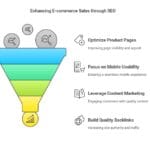
In the ever-evolving world of digital marketing, search engine optimization (SEO) remains a cornerstone of online visibility. Among the various components of SEO, link building continues to play a critical role in establishing authority and driving organic traffic. However, as search engine algorithms become more sophisticated, outdated practices no longer yield the desired results. This article delves into effective link-building strategies tailored for modern SEO.
Understanding the Importance of Link Building
Search engines, particularly Google, view backlinks as endorsements of a website’s credibility and relevance. High-quality backlinks signal to search engines that your content is valuable, increasing your chances of ranking higher in search engine results pages (SERPs). But it’s not just about quantity—quality trumps all in today’s SEO landscape.
1. Focus on Content Excellence
Great content is the foundation of any successful link-building campaign. By creating high-quality, unique, and valuable content, you increase the likelihood of earning natural backlinks. Consider these content formats:
- In-depth guides: Comprehensive articles that serve as a one-stop resource for a specific topic.
- Infographics: Visual representations of data or ideas that are highly shareable.
- Original research: Studies, surveys, or white papers with unique insights that others will cite.
2. Leverage Guest Posting
Guest blogging remains an effective way to build backlinks while expanding your reach. The key is to target authoritative and relevant websites within your niche. Ensure your guest posts provide real value to the audience and include a contextual backlink to your site.
3. Build Relationships with Influencers
Networking with influencers and industry leaders can lead to organic link-building opportunities. Engage with their content, share their posts, and collaborate on projects. Over time, these relationships can result in backlinks from high-authority sites.
4. Utilize Broken Link Building
This strategy involves finding broken links on authoritative websites and suggesting your content as a replacement. Use tools like Ahrefs or SEMrush to identify broken links and craft personalized outreach emails to webmasters.
5. Create Link-Worthy Resources
Develop resources that other websites will want to link to, such as:
- Tools or calculators: Provide practical utilities relevant to your industry.
- Ultimate lists or directories: Curate comprehensive lists that others will reference.
- How-to videos or tutorials: Offer step-by-step guidance in a visually engaging format.
6. Engage in Content Outreach
Proactively reach out to bloggers, journalists, and website owners who might find your content relevant. Craft personalized emails explaining why your content adds value to their audience.
7. Harness the Power of Social Media
Promote your content on social media platforms to increase visibility and the likelihood of it being shared. While social signals don’t directly impact SEO, they can drive traffic and lead to natural backlinks.
8. Participate in Online Communities
Join forums, discussion boards, and niche communities relevant to your industry. By providing valuable insights and linking to your content where appropriate, you can attract organic traffic and build links.
9. Monitor and Analyze Your Backlinks
Regularly audit your backlink profile using tools like Google Search Console or Moz. Remove any toxic backlinks that could harm your SEO efforts and identify opportunities to strengthen your link-building strategy.
Conclusion
Effective link building in modern SEO is about quality, relevance, and authenticity. By focusing on creating exceptional content, building genuine relationships, and leveraging innovative strategies, you can establish a strong backlink profile that enhances your site’s authority and visibility. As the digital landscape continues to evolve, staying adaptable and committed to best practices will set you apart in the competitive SEO arena.





